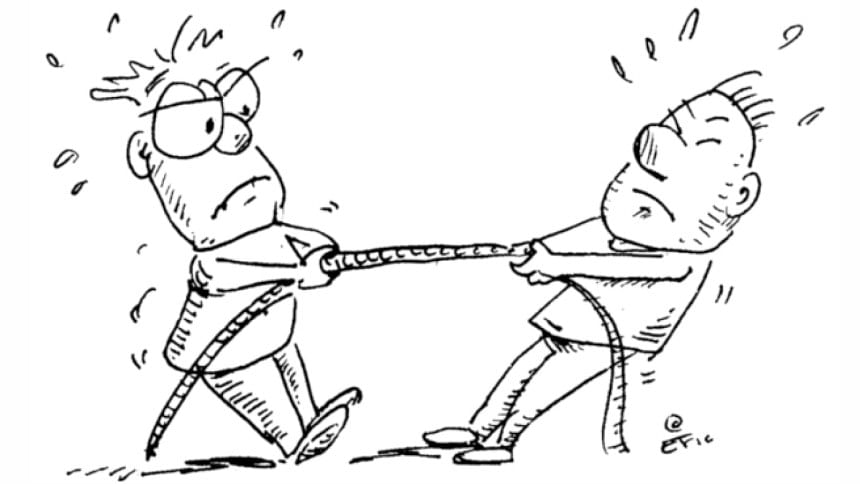Bangladesh- A fractured nation?

Where are we heading to? It is so sad! Why will infants and common people have to be burnt in the name of political movement?" wrote my FaceBook friend and brother in response to a post that I posted which said: "While so far my thought was, more or less, on how to delay death and live a meaningful life with all its joy but right now I am forced to think of not just about the inevitability of death but also about the method of death. Should it be hacking the head off the body or the barbaric murder of Jordanian pilot as in ISIS occupied Syria, or cruel deaths by petrol bombs in Bangladesh perpetrated by random contract murderers on the payroll of the opposition parties? I can avoid going near Syria and Iraq but how long can I avoid going to Bangladesh?"
Another young FB friend chipped in: "First they kill the people and after that play their filthy political games over the dead bodies. Today (February 7), within 24 hours, 10 people including 2 children died by petrol bomb." This is the friend who lost her cousin Maisha, a 15 year old sweet girl, when the hired terrorists threw a petrol bomb on a bus. The fire engulfed Maisha and her father when they were in a passenger bus on the Dhaka-Chittagong highway on February 4. That young girl could have been your daughter or sister or friend.
The debates on all aspects of media, including social media, revolve around the brutality, insanity, politics, intrigue, conspiracy, and so on by sometimes smart commentators as well as self-seeking pundits who are vying for positions in the next government. They all can be forgiven too. Politicians like political commentators will have their divergent interpretations. This is understandable too.
Beyond all that, it is time to think: how did we come here? Just consider this: why can a group of Bangladeshis -- however small and criminal -- be mobilised for a fee or promise of a reward to kill fellow Bangladeshis? The death squads may consist of some stray, random, lumpens but they are undeniably fellow Bangladeshis. The "political activists" who remove the fishplates of railway tracks are fellow Bangladeshis.
Surely, some morally bankrupt politicians whose only ambition is to go to power by whatever means possible, moral or immoral, hire these stray criminals. While the behaviour of small criminal gangs who take charge of committing murders on the highways can be understandable, it is difficult to explain the minds of their instructors and cheerleaders in the media. Political differences divide people in their interpretations of the vital national issues and how to address those issues, but to sacrifice innocent human lives at the altar of their blind ambition is unconscionable.
Sometimes extreme measures have been taken in revolutionary struggles but they often involved war between nations. A nation stands together to fight an oppressor. The rules of war are relaxed. Some people call it patriotic terrorism. In the Indian nationalist struggle, we had Master Da (SurjaSen) and Khudiram Bose, who targeted colonial administrators and outposts but not fellow Indians. In the Liberation War of Bangladesh, bridges and roads were destroyed to disrupt the marauding Pakistani military and not to take lives of fellow Bangladeshis. Did any freedom fighter throw a petrol bomb at a busload of civilian Bangladeshis?
In extreme cases, sometimes "ends justify the means" as some people invoke Niccolo Machiavelli who wrote this in the early sixteenth century. He discussed coming to "power by crime" by "some criminal and nefarious method" as one of the two ways of coming to power. The other is "when a private citizen becomes a prince of his native city with the approval of his fellow citizens." Yes, Machiavelli was thinking of the city-states since nation-states were yet unborn. And Machiavelli too prescribed the dictum "ends justify means" to the princes that as rulers they sometimes need to do unusual things in the larger interest of the republic. He definitely did not endorse hurling petrol bombs at unsuspecting passengers in a public transport.
There are only two ways one can understand the fact that a small group of Bangladeshis can be made to take actions that kill fellow Bangladeshis. First, there has been an exponential growth of criminals in Bangladesh for which the successive administrations must take responsibility. The other explanation is a failure in nation building. What happened to the "we are a nation"? Where did "we" go? Nationalism is all about a feeling of "we." If we cannot see ourselves as a nation, we are a fractured nation.

 For all latest news, follow The Daily Star's Google News channel.
For all latest news, follow The Daily Star's Google News channel. 



Comments